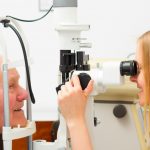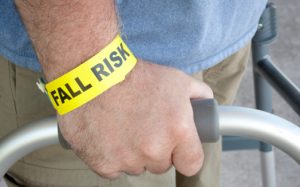Vertigo, dizziness, and imbalance are common occurrences among the elderly. It’s estimated that 20 to 40 percent of seniors over 65 who live at home experience falls. A fall in an elderly person can greatly impact their life – especially, if the individual lives alone or there is no one else around.
Advertisement
With weaker bones a fall can very well lead to bone fractures, which are much harder to heal the older and individual is. The recovery period may also result in bed rest, which can worsen pre-existing illnesses or lead to isolation and depression.
Falls caused by vertigo, dizziness and imbalance can lead to immediate injury, like cuts, bruises or even fractures, head traumas and traumatic brain injuries (TBI). All of these factors can limit a person’s abilities and create challenges on a daily basis.
The Centers for Disease Control and Prevention (CDC) report that death due to falls among the elderly is on the incline; in 2013 it was recorded that 25,500 seniors died from unintentional fall injuries. Men are 40 percent more likely to die due to a fall, and senior Caucasians are more likely to die from a fall than elderly African-Americans.
It’s important that seniors prevent falls as it can lead to serious injury and even death. To help prevent falls, understand and control contributing factors such as vertigo, dizziness and imbalance.
What causes imbalance in the elderly?
Balance is the ability to stand independently without relying on other factors – canes, walls, chairs, etc. Good balance requires sensory input from vision, the inner ear and sensors in the legs and feet. The elderly are prone to conditions that affect these systems and contribute to imbalance.
Diseases which can impair sensory systems and cause imbalance are cataracts, glaucoma, diabetic retinopathy, macular degeneration, diabetic peripheral neuropathy and the degeneration of the inner ear.
Loss in muscle and joint strength, too, can contribute to imbalance. Diseases which affect the joints, bones and muscles (arthritis, osteoporosis, etc.) can weaken the musculoskeletal system making balancing harder.
Other conditions which cause imbalance in the elderly are vertigo, low blood pressure, cardiac problems, low blood sugar, anxiety, medications and poor diet.
What are causes of vertigo in the elderly?
 Vertigo, in particular, is a condition that makes a person feel like they are moving even when at a stand-still. A person with vertigo will feel dizzy, as if the world around them is moving. This can make a person feel disoriented and increase the risk of falls.
Vertigo, in particular, is a condition that makes a person feel like they are moving even when at a stand-still. A person with vertigo will feel dizzy, as if the world around them is moving. This can make a person feel disoriented and increase the risk of falls.
There are two types of vertigo: peripheral and central. Peripheral vertigo results from a problem with the inner ear which controls balance. The parts of the inner ear which control balance are called the vestibular labyrinth or the semicircular canals.
Causes of peripheral vertigo are:
- Benign positional vertigo
- Certain medications
- Injury – head injury
- Inflammation of the vestibular nerve
- Meniere’s disease
- Pressure on the vestibular nerve – possible caused by a tumor
Central vertigo results from a problem within the brain. Causes of central vertigo are:
- Blood vessel disease
- Certain drugs
- Migraines
- Multiple sclerosis
- Seizures
- Stroke
- Tumors
Due to the severity of dizziness disorders, including vertigo, even minor episodes should be examined by a doctor as they could indicate a deeper problem.
Age-related changes in the vestibular system
 The vestibular system is a series of fluid-filled tubes and chambers which run inside the inner ear. Nerve endings detect movement, direction and gravity of the head and neck. Signals are sent through the vestibular systems which are then sent to the brain to help control balance and movement.
The vestibular system is a series of fluid-filled tubes and chambers which run inside the inner ear. Nerve endings detect movement, direction and gravity of the head and neck. Signals are sent through the vestibular systems which are then sent to the brain to help control balance and movement.
After the age of 55 nerve-cells part of the vestibular system begin to decrease along with blood flow to the ears. Age-related changes to the vestibular system then result in dizziness and imbalance as signals to the brain become weaker as nerve cells diminish.
Age-related changes to the vestibular system can also result in hearing loss as blood flow is required to activate the parts of the ear which allow us to hear.
Balancing exercises for vertigo
If you have vertigo, or experience dizziness, there are exercises which you can perform as a means to improve balance. Because the risk of fall increases the older we get, and the consequences of a fall are quite severe, it’s important to practice methods which can help us prevent such events from occurring. Below are some exercises which you can perform to better improve your balance and reduce your risk of falls.
Romberg exercise
- Stand in front of a wall and place a chair in front of you – they can support you in case you feel you are about to fall.
- Place feet together and arms by each side.
- Stand-up straight for at least 30 seconds, then rest for the same amount of time.
To progress you should work your way up to a longer time and to having your eyes closed.
Advertisement
Standing sway exercise – forward to back
- Stand in front of a wall and place a chair in front of you – they can support you in case you feel you are about to fall.
- Stand with feet shoulder-width apart and arms by each side.
- Gently lean forward and back shifting your weight from the front of your toes to your heel – do not bend at your hips.
- Increase range of lean without lifting your feet.
Standing sway – right to left
- Follow the positioning from the standing sway forward-to-back exercise.
- Instead of moving forward to back, shift your weight from left to right.
Aside from these exercises, guided activities like yoga and tai chi can also help you improve your balance. Practicing balance exercises is also a good way to exercise and an important aspect of health. Not only will you prevent falls, but you can become more active which can offer numerous health benefits, too.

